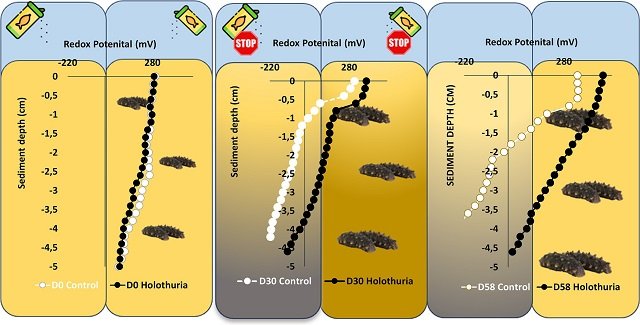
In the quest for sustainable aquaculture, scientists are continually exploring innovative approaches to minimize environmental impact.
A promising avenue lies in the fascinating world of sea cucumbers, particularly the species Holothuria poli. These bottom-dwelling invertebrates, also known as holothurians or “sea cucumbers,” may hold the key to mitigating the harmful effects of fish farms on sediment health and water quality.
Scientists from the University of Crete, the Institute of Marine Biological Resources and Inland Waters, the Institute of Oceanography, and the National and Kapodistrian University of Athens studied the potential of Holothuria poli to reduce the environmental footprint of a fish farm through a benthocosm experiment.
The Issue of Organic Wastes from Aquaculture
One of the most documented environmental impacts of aquaculture is the organic enrichment of sediment. Fish farms generate significant organic waste in the form of fish feces and unconsumed feed pellets.
This organic matter accumulates in the sediment beneath the cages, creating anoxic (oxygen-deprived) conditions that can lead to a cascade of negative consequences. These include the release of harmful gases such as hydrogen sulfide (H2S), reduced biodiversity, and disturbances in nutrient cycle processes.
Holothurians to the Rescue
Holothurians are known as detritivores, meaning they ingest and process organic matter present in the sediment. This unique feeding behavior makes them ideal candidates for bioremediation, the process of using natural organisms to clean up contaminated environments.
A Benthocosm Experiment
To investigate the potential of Holothuria poli to improve sediment conditions in aquaculture environments, researchers conducted a 58-day experiment using benthocosms, which are miniature representations of the marine environment.
The experiment consisted of two phases:
- Constant organic enrichment: A mixture of fish feces and fish feed pellets was added to simulate the typical organic enrichment of sediment in fish farms.
- Recovery: The addition of organic matter was stopped, allowing the sediment to recover.
Fundamentally, half of the benthocosms contained Holothuria poli, while the others served as controls without sea cucumbers.
Stay Always Informed
Join our communities to instantly receive the most important news, reports, and analysis from the aquaculture industry.
Holothurians Offer Environmental Benefits
The results were clear: the presence of Holothuria poli significantly reduced the environmental footprint of organic enrichment. Researchers highlight that sea cucumbers are considered good candidates for integrating integrated multitrophic aquaculture (IMTA) systems.
By actively feeding on organic matter, these sea cucumbers effectively:
- Reduced organic matter: Lowering the overall organic content in the sediment.
- Decreased H2S levels: Mitigating the release of this harmful gas.
- Increased sediment oxygenation: Creating a healthier environment for marine life.
- Improved redox potential: Promoting healthier chemical conditions in the sediment.
- Accelerated sediment recovery: Facilitating a quicker return to a natural state after the cessation of organic input.
“Our results show that holothurians not only survive by feeding on fish farm waste but also gained weight and remained active and robust,” report the scientists.
The Power of Bioremediation
The study’s findings highlight the immense potential of Holothuria poli as a natural bioremediation tool in aquaculture. By incorporating these sea cucumbers into fish farm systems, we can:
- Minimize the environmental impact of organic waste: Protect the surrounding ecosystem and enhance overall water quality.
- Promote a more sustainable aquaculture industry: Contribute to a circular economy where waste is minimized, and resources are used efficiently.
- Support biodiversity: Ensure a healthy and diverse marine environment.
Conclusion
“This study suggests that holothurians could induce a faster recovery of sediments from anoxic conditions and improve sediment condition. In this context, holothurians could be considered a tool to mitigate the effects of aquaculture and improve sediment conditions beneath fish farms,” conclude the researchers.
Further research is needed to optimize the integration of Holothuria poli into aquaculture practices. However, this study paves the way for a future where these fascinating sea cucumbers play a crucial role in ensuring the sustainability and environmental responsibility of the aquaculture industry.
The study was conducted within the framework of the project “Innovative Development of Multitrophic Aquaculture,” funded by the “Innovation in Fisheries” EU-Greece Operational Program of Fisheries and Maritime, EPAL 2014–2020.
Contact:
Dimitra Chatzivasileiou
Marine Ecology Laboratory, Department of Biology
University of Crete
GR 70013 Heraklion, Greece
Email: chatzivasileioudim@uoc.gr
Reference (open access):
Dimitra Chatzivasileiou, Panagiotis D. Dimitriou, Irini Tsikopoulou, Maria Lampa, Nafsika Papageorgiou, Manolis Tsapakis, Ioannis Karakassis. 2024. Holothurians play an important role in mitigating the impacts of aquaculture on sediment conditions, Marine Pollution Bulletin, Volume 198, 2024, 115856, ISSN 0025-326X, https://doi.org/10.1016/j.marpolbul.2023.115856.
Editor at the digital magazine AquaHoy. He holds a degree in Aquaculture Biology from the National University of Santa (UNS) and a Master’s degree in Science and Innovation Management from the Polytechnic University of Valencia, with postgraduate diplomas in Business Innovation and Innovation Management. He possesses extensive experience in the aquaculture and fisheries sector, having led the Fisheries Innovation Unit of the National Program for Innovation in Fisheries and Aquaculture (PNIPA). He has served as a senior consultant in technology watch, an innovation project formulator and advisor, and a lecturer at UNS. He is a member of the Peruvian College of Biologists and was recognized by the World Aquaculture Society (WAS) in 2016 for his contribution to aquaculture.







